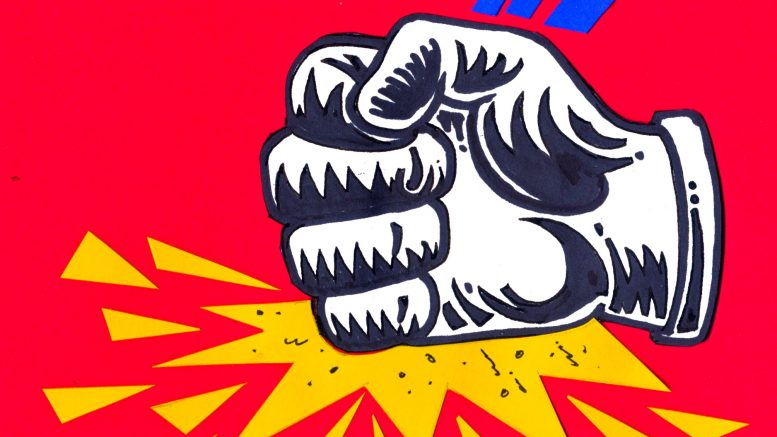
By Laura Flanders
Common Dreams (5/20/19)
Can it happen here? Absolutely it can. Even in a liberal bastion. A few weeks ago, a handful of white supremacists marched into a bookstore in Washington D.C., temporarily disrupting a talk by Jonathan Metzl, the author of Dying of Whiteness: How the Politics of Racial Resentment is Killing America’s Heartland.
To put this in context, this was in Politics and Prose, in hip DuPont Circle, during an Antiracist Book Festival, on the same day that a 19-year-old white supremacist shot up a California synagogue, killing one person and injuring three others.
Around the same time, two members of the same group, calling itself the American Identity Movement, dressed up in clown suits to disrupt a story hour for kids led by drag queen performers at a New Orleans public library.
It’s not the hate that’s new. It’s the apparent sense of entitlement. Today’s hate groups aren’t flying-by night; they’re out in plain sight, and not just in the media’s backwaters but in the nation’s capital.
These aren’t isolated events. The Washington Post reports that white nationalists have been targeting bookstores and libraries across the country for a while, in one instance, going so far as to threaten to burn the store down. Elsewhere, progressive groups are facing threats of violence and intimidation on campus; for example in Portland, where white so-called Patriot groups have targeted meetings of the DSA and the ISO and vandalized an office of the IWW.
It’s not the hate that’s new. It’s the apparent sense of entitlement. Today’s hate groups aren’t flying-by night; they’re out in plain sight, and not just in the media’s backwaters but in the nation’s capital.
Intimidation
As Metzl put it, today’s racist bullies seem especially emboldened. And social media’s a big part of that. In person, two guys in clown suits, or even half a dozen with a megaphone, aren’t much of a threat, but in social media, stunts like these appear bigger than they are.
Uploaded to the web, videos of the book protests prompted messages of praise on Youtube and much online chatter from right and left. Zapped round the web, the intimidation factor is amplified and potential followers egged on.
Which makes an international initiative to curb the spread of hate online at least worth paying some attention to. The “Christchurch Call,” a global pledge to combat online extremism unveiled by New Zealand Prime Minister Jacinda Ardern and French President Emmanuel Macron, is a commitment to work with tech companies to halt the spread of extremist content. It’s far from a complete solution but it is a start. The US should sign on. President Trump hasn’t of course. He sees no problem.
(Our work is licensed under a Creative Commons Attribution-Share Alike 3.0 License. Feel free to republish and share widely.)
- Leaked Proud Boys Chats Show Members Plotting Violence At Rallies — The extremist gang claims it’s just a pro-Trump “drinking club.” But chat logs leaked to HuffPost reveal they plan weaponry and tactics months ahead. The Proud Boys want the public to believe that they’re a “drinking club” who only resort to violence to defend themselves from anti-fascist protesters during political rallies. But in private, these extremists have discussed injuring and even killing their adversaries, plotting tactics and optics for months in order to assert a claim of self-defense should they face charges. … Read the Rest
(Commoner Call cartoon by Mark L. Taylor, 2017. Open source and free for non-derivative use with link to www.thecommonercall.org )
*****
Racism, Sexism, Nazi Economics: Estonia’s Radical Far Right Surges To Power
Until recently seen as a model nation, Estonia’s politics are turning darker.
By Shaun Walker
The Guardian (5/21/19)
A shadowy “deep state” secretly runs the country. A smart immigration policy is “blacks go back”. Nazi Germany wasn’t all bad. None of these statements would be out of place in the darker corners of far-right blogs anywhere in the world. But in Estonia as of last month, they are among the views of government ministers.
Since emerging from the Soviet shadow three decades ago, Estonia has gained a reputation as a country with a savvy focus on e-government, a vibrant free media and broadly progressive politics. But as in many European countries, Estonia’s far right has been edging upwards in the polls in recent years, and nobody was all that surprised when the nationalist EKRE party won 19 out of 101 seats in parliamentary elections in March. The real shock came a few weeks later when the prime minister, Jüri Ratas, invited EKRE to join a coalition government.
Ratas offered EKRE five out of 15 ministerial positions as well as policy concessions including agreeing to hold a referendum on whether to define marriage as only between a man and a woman.
The party’s father-and-son leaders, Mart and Martin Helme, took the key posts of interior and finance minister respectively and celebrated by flashing a white-power symbol at their swearing-in ceremony.
EKRE’s transition from the noisy fringe to the heart of government represents a remarkable failure of mainstream politics. Between them, two broadly centrist parties won a comfortable majority of seats in the March vote, and Kaja Kallas, the leader of the Reform party which placed first, offered Ratas and his Centre party a coalition in which she would be prime minister and the two parties would share ministerial posts equally.
Dangerous shift
Instead, ignoring the offer and stark warnings from his allies in Brussels not to negotiate with EKRE, Ratas arranged a conservative coalition including the far-right party, which has allowed him to stay on as prime minister. “He threw all his values down the drain just to remain PM,” said Kallas, who had been on course to become Estonia’s first female prime minister but instead remains in opposition.
Many liberals fear the climate has already started to change. …
*****
Italy’s Far-Right Extremist Matteo Salvini Hopes To Lead Nationalist Wave In Upcoming European Elections
By Sylvia Poggioli
Morning Edition / NPR (5/22/19)
Ahead of elections this week for a new European Parliament, 11 populist leaders rallied last Saturday in Milan’s Piazza Duomo. They vowed to reassert their national sovereignty by wresting control from European Union bureaucrats headquartered in Brussels. Their host: Italy’s Deputy Prime Minister Matteo Salvini, the leader of Italy’s far-right League party and Europe’s rising populist star.
As a recording played the late tenor Luciano Pavarotti singing Puccini’s Nessun Dorma aria, with its refrain of “Vincerò!” (I will win), Salvini took center-stage before a crowd of some 20,000 cheering fans.
“Italy is the most important place in the world politically right now, because [of] the League [and] the rise of Salvini. Matteo Salvini resurrected Italy’s national pride.”
— Trump adviser Steve Bannon
Clutching a rosary and flanked by France’s far-right leader Marine Le Pen and 10 other European ethno-nationalists, Salvini dismissed his critics. “In this square, there are no racists, no fascists,” he said.
“The extremists are those who led Europe into insecurity and poverty — Merkel, Macron and Soros,” Salvini said, referring to German Chancellor Angela Merkel, French President Emmanuel Macron, and Hungarian-American philanthropist George Soros, a frequent target of the far right.
One of Salvini’s biggest fans is Steve Bannon, President Trump’s former chief strategist. …
Read the Rest and 4-Minute Audio


